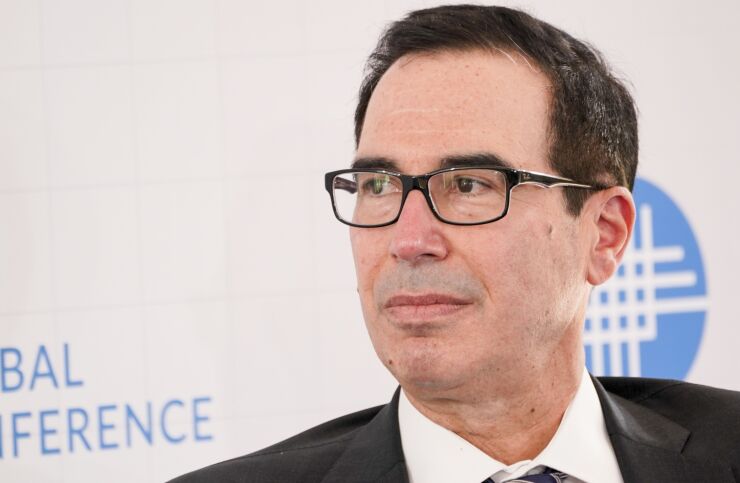Bankers, investors and former Treasury Secretary Steven Mnuchin have no appetite for playing games with the U.S. debt ceiling.
"We need to have the debt ceiling raised quickly with close to $30 trillion in debt at risk," Mnuchin said at one panel at the Milken Institute Global Conference in Beverly Hills this week.
The three-day conference, sometimes called the U.S. Davos, landed during a week that began with JPMorgan taking over San Francisco regional bank First Republic and Treasury Secretary Janet Yellen warning in a letter to Congress that the country could be in default by June 1 if lawmakers don't raise the debt ceiling.

Limits on spending need to be negotiated, Mnuchin said Tuesday, though he added that former House Speaker Nancy Pelosi, D-Calif., made it clear when he was treasury secretary that no debt ceiling agreement would be reached without a spending increase.
The House of Representatives last week passed poison pill legislation sponsored by House Speaker Rep. Kevin McCarthy, R-Calif., that would lift the debt ceiling, but the bill isn't expected to pass the Senate, given it would claw back unobligated COVID-19 relief funding and make other unpopular cuts. The McCarthy-sponsored bill would only raise the debt ceiling for a year. The bill is likely dead on arrival in the Senate, but would kick off negotiations.
Though he ticked off the debt limit, risk to regional banks and weakness in commercial real estate as concerns, fellow panelist Peter Orszag, chief executive officer of financial advisory at Lazard Freres & Co. said he thinks "the positives are good and the negatives are addressable" for the U.S. economy.
"Whether you are a bull or a bear depends on what the federal government does," Orszag said.
Yellen's debt limit warning came as the Congressional Budget Office announced that income tax receipts came in lower than expected, Orszag said.
"After reviewing recent federal tax receipts, our best estimate is that we will be unable to continue to satisfy all of the government's obligations by early June, and potentially as early as June 1, if Congress does not raise or suspend the debt limit before that time," Yellen wrote in a letter to Congress.
The lower-than-expected tax receipts might be a signal about the economy and accelerate the date by which the debt limit needs to be raised, Orszag said.
He added that one of his concerns about the House debt ceiling bill is that it only extends the debt limit by one year, and "we don't want to be having a conversation about raising the debt limit during an election year."
The debt ceiling should be raised for at least two years, Orszag said.
"Everything we see, if you put it in the perspective of consumers and businesses, is still remarkably strong," said Charlie Scharf, chief executive officer of Wells Fargo. "If you look at the trends of what is happening, it's not necessarily whether things are getting worse, but whether you see any acceleration."
There is some weakness among subprime customers, but the rest of the customer base is doing fine, Scharf said.
"Delinquencies are going up slowly, which is manageable for consumer banks," Scharf said.
"We shouldn't be having to talk about the debt ceiling," Scharf said. "This is something within our control. But that is a gigantic risk that changes the equation if something doesn't get done."
Goldman Sachs is projecting there is now a 35% chance of a U.S. recession, said Elizabeth Burton, former Hawaii state pension investment officer, referring to a
U.S. institutional investors are in a challenging situation given the uncertainty, because every year in June they set their allocation targets, Burton said.
The consensus from panelists was that while the short-term economic picture is murky, they are all bullish on the long-term prospects for the U.S. economy.





